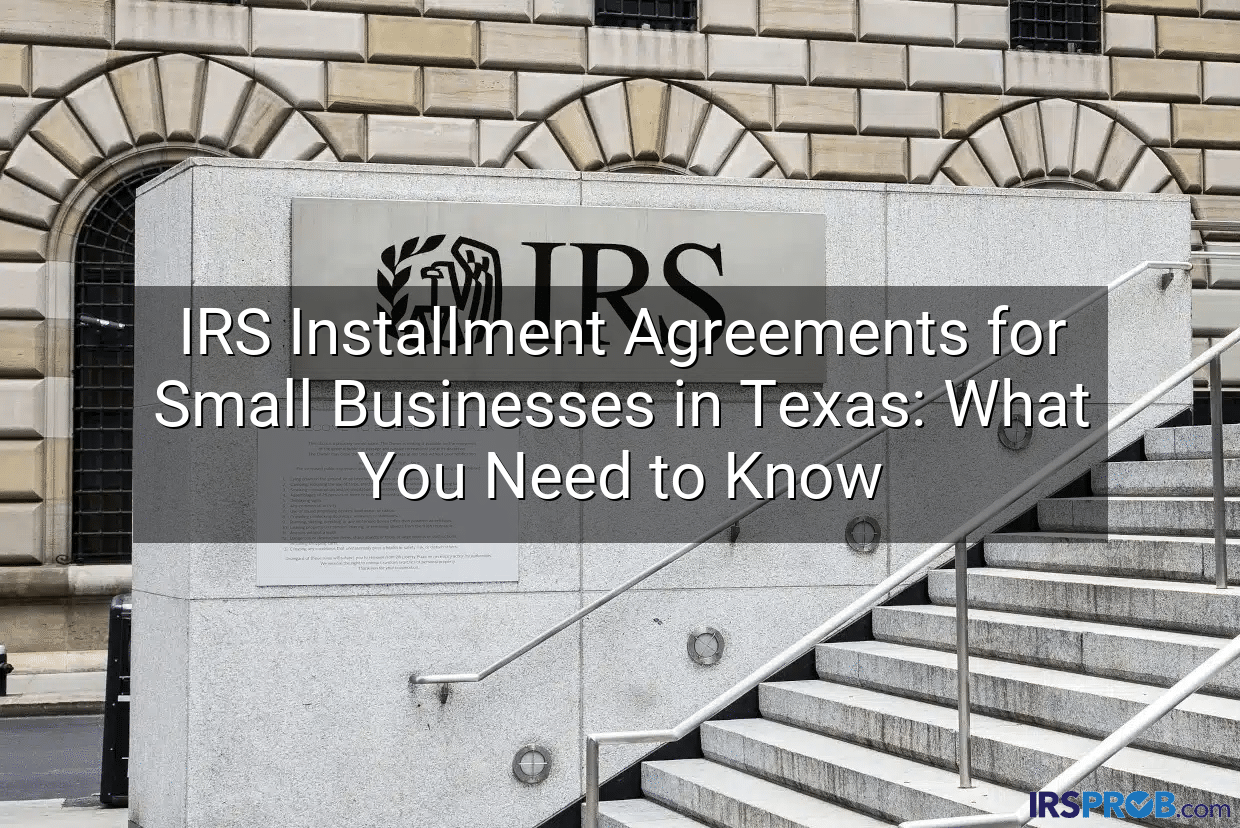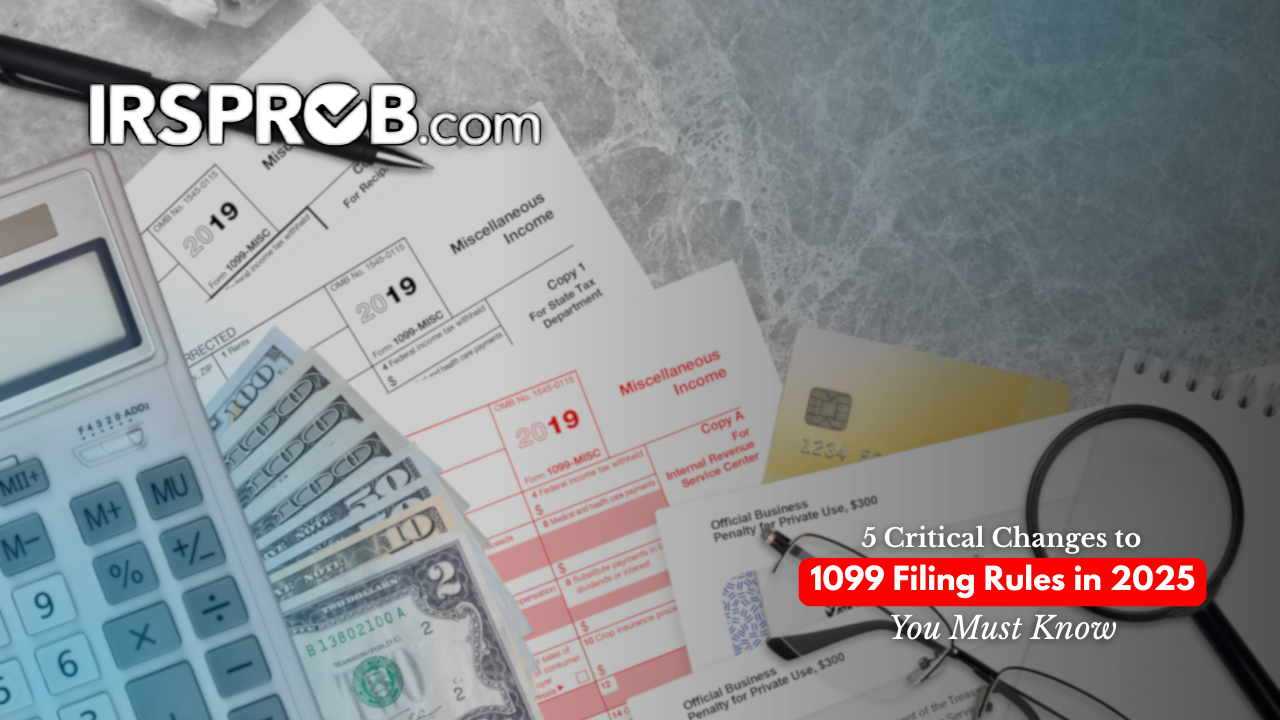Overview of IRS Installment Agreements for Texas Small Businesses
Small business owners in Texas often face unique financial challenges, and understanding the available tax relief options is critical. IRS installment agreements allow businesses to manage back taxes by paying off tax liabilities over a defined period. In this blog post, we will explore everything related to IRS installment options texas small business owners need to know, including application processes, financial documentation readiness, and the nuances of tax agreements specific to Texas.
IRS installment agreements are particularly beneficial for small businesses that encounter cash flow issues but still wish to maintain good standing with the IRS. By breaking down large tax liabilities into more manageable monthly installments, business owners can focus on growing their operations while keeping their tax obligations under control.
This guide has been curated to provide detailed insights into the process, highlighting the key steps involved, potential pitfalls, and pro tips for ensuring a seamless experience when applying for installment agreements. Whether you are just beginning to explore this option or already in discussions with the IRS, this post will serve as a one-stop resource for all your queries.
Understanding the Benefits and Drawbacks of IRS Installment Agreements
IRS installment agreements offer a structured plan to resolve outstanding tax liabilities by spreading the total amount due over time. For Texas small businesses, this can be a lifeline that prevents severe financial strain. The primary benefit of an installment agreement is the ability to avoid more aggressive IRS collection actions, such as liens or levies. By opting for a manageable payment plan, business owners can maintain smoother cash flow and allocate resources more effectively to sustain and grow their operations.
In addition to cash flow benefits, these agreements also offer the advantage of reducing immediate financial stress. The IRS typically provides flexible terms, sometimes even allowing low monthly payments that adjust based on the business’s overall revenue.
However, it is essential to understand that while installment agreements provide valuable relief, they also have drawbacks. For example, interest and penalties will continue to accrue on the outstanding balance, potentially increasing the total amount paid over the life of the agreement. Additionally, failing to adhere to the agreed payment schedule can lead to default and more stringent collection actions.
Another potential drawback is the complexity of the application process, especially for those unfamiliar with IRS procedures. Nevertheless, with the right preparation and understanding of IRS installment options texas small business, these challenges can be mitigated.
Eligibility Criteria for IRS Installment Options Texas Small Business
Before applying for an IRS installment agreement, Texas small business owners must ensure they meet specific eligibility criteria. Generally, the IRS considers both the amount of tax owed and the taxpayer’s financial situation when determining eligibility for an installment agreement. For many small businesses, qualifying for IRS installment options texas small business involves demonstrating genuine financial hardship and providing detailed financial records.
Eligibility criteria typically include a comprehensive review of current income, expenses, assets, liabilities, and business performance. The IRS may require business owners to complete Form 433-A (Collection Information Statement for Businesses) or Form 433-B for individual taxpayers with business income. In cases where tax liability is below certain thresholds, the process may be streamlined, but transparency in financial reporting remains a priority.
Businesses that have a long history of tax compliance and accurate filings may find it easier to meet these requirements. However, for those who have struggled with compliance in the past, it may be necessary to consult a tax professional to properly prepare their documentation.
It is also vital to note that even if a business qualifies for an installment agreement, the IRS might impose conditions that include regular review of the business’s financial condition to ensure continued eligibility throughout the term of the agreement.
Step-by-Step Guide to Applying for IRS Installment Agreements
Applying for an IRS installment agreement involves several critical steps that require careful attention to detail. Texas small businesses looking to leverage IRS installment options texas small business should first gather all necessary financial documents, including tax returns, business financial statements, and detailed records of income and expenses.
The initial step is to assess the total tax liability accurately. Once you have a clear picture of how much you owe, you can explore various installment options available from the IRS. Applications can often be submitted online for liabilities below certain thresholds, potentially expediting the approval process. However, if the liability exceeds these limits, a paper application accompanied by documentation may be required.
After determining your eligibility, the next step is to complete the necessary forms. For many small businesses, this often entails filling out Form 9465 (Installment Agreement Request) and, in some cases, Form 433-A or 433-B to provide comprehensive financial information. Always double-check all figures and ensure there are no discrepancies in the documentation.
Once the forms are submitted, the IRS will review your application and, if approved, propose a payment schedule that fits within the payment capabilities of your business. Business owners should carefully review the proposed terms and, if necessary, negotiate for more favorable conditions. Maintaining an open line of communication with the IRS is crucial during this period.
For Texas small businesses, working with a tax professional experienced in IRS installment agreements can be beneficial. They can guide you through the application process, help prepare your documentation, and communicate with the IRS on your behalf if challenges arise.
Effective Financial Planning and Documentation for Installment Agreements
One of the critical factors for successfully obtaining an installment agreement is the preparation of robust financial documentation. Small businesses in Texas must diligently prepare and maintain detailed records that clearly demonstrate their ability to repay the tax liability over time. Financial planning is not only about proving your current financial condition but also projecting future cash flows to reassure the IRS of your repayment capacity.
Business owners should start by updating bookkeeping records and ensuring that all income, outgoings, and tax-related transactions are meticulously documented. Consistent recordkeeping can also prevent delays during the installment agreement application process. Furthermore, using accounting software tailored to small businesses can assist in generating accurate financial statements and tax reports, which are crucial when filing for installment agreements.
It is also advisable to prepare a comprehensive budget that incorporates expected future revenues and expenses. This budget should demonstrate a realistic plan for how the business will meet installment payments while maintaining operational stability. Detailed documentation and clear financial planning send a strong message to the IRS that your business is committed to resolving its tax liabilities responsibly.
Additionally, maintaining clear records may also help in identifying areas for cost savings and improving overall business operations—a benefit that extends beyond the context of IRS negotiations.
Managing IRS Communications and Dispute Resolutions
Effective communication with the IRS is pivotal when managing installment agreements. For Texas small businesses, keeping an open and transparent line of communication can facilitate smoother negotiations and fewer complications. Prompt responses to IRS inquiries, clear explanations of financial conditions, and timely updates on business performance are all factors that contribute to a positive rapport with tax authorities.
Should disputes or disagreements arise regarding your installment agreement terms, it is crucial to remain proactive. Business owners are advised to document all communications with the IRS, maintain copies of correspondence, and keep detailed logs of phone and in-person conversations regarding the installment agreement. This transparency can be instrumental in contesting any misunderstandings or errors in the process.
In some cases, if an agreement is challenged, it may be beneficial to seek the assistance of a tax professional or an attorney specializing in tax law. These experts understand the nuances of IRS procedures and can provide strategic advice to ensure that your rights are protected while pursuing a favorable outcome.
Moreover, staying informed about any changes in IRS policies or deadlines is essential. Subscription to IRS newsletters or regular consultation with a tax advisor can help maintain updated knowledge, ensuring that your responses to IRS communications are timely and appropriate.
Local Assistance and Resources for Texas Small Businesses
Texas small business owners have access to a variety of local resources that can assist with navigating IRS installment options texas small business. Many local chambers of commerce, business development centers, and nonprofit organizations provide counseling services, financial planning workshops, and one-on-one advisory sessions for small business owners dealing with tax issues.
These organizations can offer a wealth of information, including guidance on financial documentation, insights into local tax laws, and referral services to qualified tax professionals. By tapping into these resources, business owners can gain a clearer understanding of how to manage tax liabilities, prepare accurate financial records, and negotiate more favorable installment agreement terms with the IRS.
Additionally, local educational institutions and universities sometimes offer community outreach programs or continuing education courses focused on small business financial management and tax compliance. These courses are designed to help business owners stay informed about best practices and recent changes in tax legislation that may impact their installment agreements.
For those facing particularly complex situations, seeking personalized consultations with tax attorneys or certified public accountants in Texas can provide targeted assistance. These professionals are well-versed in the unique challenges faced by small businesses in Texas and can offer tailored strategies that align with your specific financial circumstances.
Alternative Tax Relief Options for Texas Small Businesses
While IRS installment agreements are a popular solution for managing tax liabilities, they are not the only option available to Texas small businesses. Depending on the specifics of your situation, other tax relief measures might prove to be more advantageous. Understanding all available alternatives is critical to ensuring that you choose the best approach for your financial circumstances.
For instance, if your business qualifies, you might consider an Offer in Compromise (OIC). This program allows taxpayers to settle for less than the full amount owed if the IRS determines that paying the full tax bill would cause undue financial hardship. However, the OIC process is rigorous and often requires extensive documentation and negotiation.
Another alternative is currently not as popular as an installment agreement but still worthy of mention: the Currently Not Collectible (CNC) status. This status temporarily pauses collection efforts if your business demonstrates that paying any amount would impair its ability to meet basic living expenses. Keep in mind that while the CNC status may provide temporary relief, interest and penalties typically continue to accrue on your account during this period.
Small business owners should closely evaluate their long-term financial outlook when considering these alternatives. In many cases, a combination of financial planning strategies—including restructuring debt and re-evaluating expenses—can work in tandem with IRS installment options to create a more sustainable solution.
Frequently Asked Questions
Pro Tips from IRS Prob
Pro Tip #1: Prepare Comprehensive Financial Documentation
Before applying for an installment agreement, ensure your financial statements, tax returns, and expense records are current and meticulously organized. Detailed documentation not only accelerates the approval process but also reinforces your credibility, showing that your IRS installment options texas small business plan is grounded in solid financial planning. Consider using professional accounting software or working with a certified public accountant to review your records for accuracy.
Pro Tip #2: Maintain Open Communication with the IRS
Establish a clear line of communication with the IRS from the onset. Promptly respond to any inquiries or requests for additional documentation. Regular updates about your business’s financial status can help prevent misunderstandings and keep the negotiation process smooth. This proactive approach is essential for successfully navigating IRS installment options texas small business and safeguarding your agreement against potential disputes.
Pro Tip #3: Leverage Local Resources and Professional Expertise
Texas small business owners should not hesitate to tap into local resources such as chambers of commerce, business development centers, and local tax professionals. Engaging with experts who understand the intricacies of IRS installment agreements can provide tailored strategies and practical guidance. This local expertise can be the key to not only securing the installment agreement but also optimizing your overall financial management strategy.
In summary, navigating the complexities of IRS installment agreements requires a well-informed approach, meticulous planning, and proactive communication. Texas small business owners who take the time to understand the eligibility criteria, prepare accurate financial documentation, and consider alternative tax relief options can better position themselves for success. Remember that while an installment agreement can alleviate immediate financial pressure, it is vital to continue monitoring your business’s financial health and maintain open dialogues with the IRS. The actionable insights and tips provided in this guide aim to empower you with the knowledge and confidence to make informed decisions regarding IRS installment options texas small business, ensuring the long-term stability and growth of your business.
This comprehensive guide serves as a resource for all the essential aspects involved in applying for and managing IRS installment agreements. By integrating professional advice, a detailed walkthrough of the process, and practical tips for ongoing success, you are equipped to face the challenges head-on while securing viable financial relief. With the right preparation and support, resolving your tax liabilities can become a manageable and constructive part of your financial strategy.







